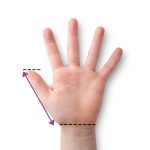This blog reports statistics on children’s oral health in the United Kingdom and how children’s dental health might impact their general health.
Many parents are concerned about their child’s oral health, and for good reason. While children are often attracted to sweet, sugary food and drinks, research has proven that these treats can cause long-term damage to teeth.
And it is not just teeth that can be affected. Statistics show that children’s oral health has a significant impact on their general health in both the UK and abroad.
What can be done about this? Thumbsie® have researched records on dental health among children from a range of sources, including the Government, Public Health England and NHS, and we’ve compiled these statistics in one easy-to-read article below.
1. The state of children’s oral health
So, what is the current state of children’s oral health in the UK? In two words: not good. The Oral Health Foundation describes a “heart-breaking level of childhood tooth decay” in the UK. And, tragically, the figures back this up.
i) Tooth decay
Tooth decay is the most common oral disease affecting children and young people, yet it is largely preventable. Sadly, tooth decay is a deep-seated problem in the UK. The British Dental Journal has noted that 33.4 percent of children attending state secondary schools in England have visible dental cavities in their teeth.
And it is not just older children that are affected. According to Public Health England, almost a third of 5-year-olds and 12 percent of 3-year-olds in England have experienced tooth decay.
Children with tooth decay have on average 3 teeth that were decayed, missing or filled, according to UK Government statistics.
Unfortunately, as with many aspects of British life, there are clear divides based on social class and geography. The Local Government Association has highlighted that in England there is huge variation in the number of five-year-olds experiencing tooth decay depending on their local authority and postcode. These figures range from 4 percent in parts of the West Country to 56 percent in Blackburn, Lancashire. In south-east England, 21 percent of five-year-olds have had tooth decay, while the corresponding figure for north-west England is 35 percent.
However, it is important to note that this is not just a problem in the UK. The Center for Disease Control and Prevention (CDC) in the United States has noted that children aged 5 to 19 years from low-income families are twice as likely (25 percent) to have cavities, compared with children from higher-income households (11 percent). Indeed, tooth decay is a problem affecting young people of all ages in the United States: over half of 6- to 8-year-olds and over half of 12- to 19-year-olds have had at least one cavity.
Data from Public Health England shows that a quarter (23 percent) of 5-year-olds experienced tooth decay in England in 2019 – and the vast majority went untreated. In addition, for many years tooth extractions have been the most common reason for 6- to 10-year-olds being admitted to hospital, most of which are due to tooth decay.
2. Other child oral health issues
While tooth decay is often caused by a poor diet high in sugar, there are oral health problems which can be caused by other bad hygiene practices, for example thumb sucking.
i) Tooth placement
As a result of thumb sucking, a child’s upper front teeth often protrude, making them much more prominent and “stuck out”. This can result in possible embarrassment for a child and can ultimately result in long-term issues with their bite.
Thumb and finger sucking habit?
Help your child prevent the problems that prolonged and aggressive thumb and finger sucking can cause Buy Nowii) Overbite
While the top teeth can start to protrude, the lower teeth typically do not. This results in an overbite where the top and bottom teeth do not properly meet. This, in turn, can lead to issues with speech and the ability to chew.
iii) Jaw alignment
The early years of a child’s physical development are crucial, and it is important to ensure habits such as thumb sucking do not have a detrimental impact on growth. In some serious cases, excessive thumb sucking can lead to misaligned jaws where the upper jaw is too narrow for the lower jaw. This can be especially serious and is more difficult to correct than an overbite.
3. How does children’s oral health impact on their general health?
There can be little doubt that poor oral health contributes to bad overall health, in addition to economic damage to both families and broader society. Tooth decay can result in pain, infection, lack of sleep and time off work or school. It also costs a lot to treat in both general dental practices and hospitals.
Many of the 23 percent of children who start school with tooth decay may need treatment resulting in absence from school and the need for parents to take time off work. UK Government figures show that 36 percent of school children in north-west England have missed days off school due to dental pain or infection. Across the UK, an average of 3 school days were missed due to oral health problems.
In 2014, just under 26,000 5- to 9-year-olds were admitted to hospital for dental decay, resulting in an estimated cost of £14.5million, the National Institute for Health and Care Excellence estimates. These costs are only believed to have grown in recent years.
Tooth extractions for children under 5 cost the NHS £7.8 million in 2015, at an average cost of £836 per tooth.
Oral health is seen as a marker of wider health and social care issues including poor nutrition and obesity. Public Health England notes the correlation between obesity and dental decay and say that a reduction in sugar intake could reduce both of these issues, stating that “deprivation and high intakes of free-sugars are known risk factors for both dental caries and for obesity.” They also state that “evidence shows that poor oral health may also be indicative of dental neglect and wider safeguarding issues.”
4. What can be done to improve my child’s oral health?
i) Brush at least twice a day
It may be a cliché but brushing your teeth twice a day really is important. According to the NHS children and adults alike should brush at least twice a day to stop plaque building up. Plaque is a form of bacteria which can coat your teeth and lead to gum disease and even tooth decay.
Most people brush their teeth in their morning and before bed, but some also brush after lunchtime too.
ii) Brush all your teeth
Another important measure is to make sure you brush all your teeth, one by one. It can be easy to just focus on the front teeth, but it is important to spend time on you back and side teeth too.
Each of your teeth need to be kept clean to avoid gum disease and make sure you have good oral hygiene.
Remember, also, to brush all three sides of your teeth: inside, outside and the chewing surface.
Tips on a Healthier Smile
Read more about how to get a healthy smile from Leigh Hunter, Oral Health Coachiii) Take your time
Children often try to rush through their teeth cleaning routine, but it should not be a race! If you are brushing properly, it should take 2 to 3 minutes. There are many apps which can be used to time tooth brushing, or you can even go old-school and use a stopwatch.
Children thrive on routine, so it is important to make sure toothbrushing is a set daily habit at the same time each day – typically before school in the morning and before bed at night.
Parents should start brushing their child’s teeth as soon as the first milk tooth breaks through and they should supervise their child up to the age of 7.
The Pharmaceutical Journal advises that children of all ages can use family toothpaste, as long as it contains 1,350 to 1,500ppm fluoride. Also remember that you never need as much toothpaste as you may think. For children under 3, it’s a smear of toothpaste, and for those between 3 and 6, a blob the size of a pea.
5. And what about thumb sucking?
Throughout this article, we have noted the vital importance of good oral health. Taking dental hygiene seriously can save money – both for individual families and the NHS – it can improve general health and wellbeing, and it can prevent potentially serious long-term damage. But we’ve also noted the potential harm caused to teeth by thumb sucking, and that’s where a Thumbsie® comes in.
Thumbsie® is an award-winning product, officially accredited by the Oral Health Foundation, which helps children quit the thumb sucking habit.
Thumbsies® are handmade fabric thumb guards which are secured around the wrist using Velcro®. The glove comes in 5 different sizes and has a very simple measuring guide. The product covers the thumb and acts as a constant reminder when children put their thumb in their mouth. A Thumbsie® is perfect for any child over the age of 3, and they even come in multiple designs.
Best of all, children can wear them all day, at home and school, as they should not restrict them playing, writing or painting.
You might like to read further about whether thumb sucking runs in families and is there a significant sex difference in thumb sucking.
Please note all comments will need to be approved before appearing on this page. Please respect others when posting.


































Comments